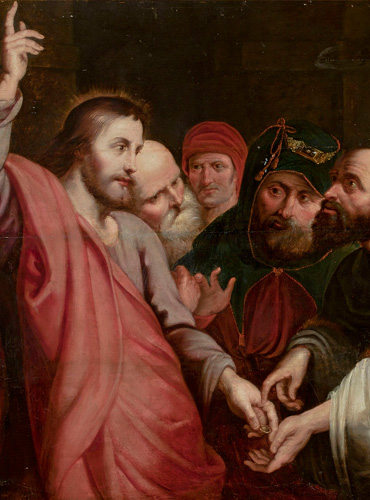Tuesday of the Ninth Week of Ordinary Time – Mk 12:13-17
Today’s Gospel presents us with a well-known incident in Christ’s life: while there’s a lot we could say, we can consider three details that can be useful for our meditation: first, the fact that Jesus doesn’t have a coin on Him, second, the coin itself, and thirdly, that what has Caesar’s image on it belongs to him.
First, it calls our attention that Jesus doesn’t have a coin on Him. In fact, Jesus’ request that they bring a denarius to look at is phrased in such a way in Greek that it implies Christ hasn’t even seen such a coin before; He’s never laid eyes on one. And there’s a reason for that: the coins had the emperor’s image and an inscription that proclaimed him more than just a ruler: he was a religious figure worthy of veneration. More observant Jews maintained that even just having a coin was to commit idolatry. Of course, none of that bothers Christ’s accusers (who include Pharisees, the most observant Jews); they are so anxious to convict Him that they made sure to have on one hand, even if it is idolatry.
The hypocrisy of Christ’s accusers is seen even more clearly when we consider the coin itself, our second point. On one hand, the coin itself was basically worthless; modern scholars place its value around 17 cents – essentially nothing. Furthermore, to placate the Jews, the Romans had even issued denarius coins without the offensive image and inscription. Simply to prove a point, Christ’s accusers are willing to commit idolatry with a 17-cent coin.
Christ’s answer is well-known. The coin has Caesar’s image on it, and so it should be given to him; if we apply that argument to Christ’s words about God, we should ask ourselves: “Well, what has God’s image on it?” Because whatever has God’s image should be given to God, just as whatever has Caesar’s image should be given to Caesar. . . .
We are made in God’s image and likeness. We have His image, and thus we must give ourselves entirely to God and to His service.
This has to be the governing principle of our lives: we are made in God’s image, and we owe Him everything. If we keep this in mind, everything else falls into place. If we lose sight of it, however, we can easily because like Christ’s accusers, who do anything and everything to prove their point. Mark tells us that they were “greatly astonished” by Christ’s answer, and the verb form tells us that it wasn’t a passing astonishment: they were continuously, or constantly astonished by Him. Yet, that astonishment did them no good, because it didn’t affect their lives in a real way. It bore no fruit, and, indeed, they were willing to commit great sins for a small temporal advantage (or so they thought).
Today we can ask ourselves about our awareness of being made in God’s image. Is there some place in our lives we refuse to give God what is His? What is our denarius?
Let us ask, through the intercession of Mary, Queen of Heaven, for the grace to give ourselves entirely to God, rendering unto Him what is His.






